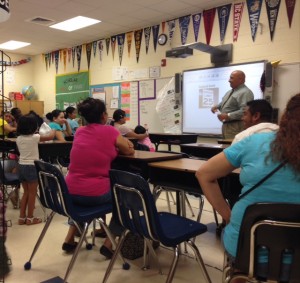Costa Rica Teaching Jobs – When discussing job opportunities we often take for granted the most important element. A freshly printed cover letter, resume or CV and, increasingly nowadays, a sharp LinkedIn account are surely requisites to any job application process. With these as a given – and lots of attention being given to make them as impressive as possible – focus can be detracted from the most important part of the process: the interview.
 Teaching English in Costa Rica has many mutually beneficial elements for both employer and employee. As an employee, a teacher can live abroad and gain that lacking experience in a field that they may not have a chance to elsewhere. From the school’s perspective, they are able to hire employees who have those goals – and thus not have to offer much of an employment package in return.
Teaching English in Costa Rica has many mutually beneficial elements for both employer and employee. As an employee, a teacher can live abroad and gain that lacking experience in a field that they may not have a chance to elsewhere. From the school’s perspective, they are able to hire employees who have those goals – and thus not have to offer much of an employment package in return.
The risks for schools and institutes lie in the quality of person they are hiring. This is why acing the job interview is imperative.
With benefits and salaries not on par for similar positions in other locations around the world, language schools in Costa Rica cannot – and don’t – expect world-class instructors to apply. What they do expect is for applicants to be responsible, mature, and flexible; what schools sacrifice in expertise is made up in character.
This is where your self-described bare resume fills itself in. While interviews for ESL positions in Costa Rica may appear to be like just any other interview, the answers you provide – and how you answer them – give just as much insight into your character as it does your perceived abilities in the classroom.
What employers really seek are teachers that won’t complain about common occurrences such as last minute schedule changes, working weekends, and offering or accepting to cover other teachers’ classes for various reasons. If you can demonstrate that you’re a team player in the interview, you will already have a leg up on the competition.
Equally as important is what not to say – or even bring up – in your interview. While schools know the majority of new hires will be lean on experience, they won’t hire just anyone. Not unlike job interviews for other fields, there are certain topics that should be bridged with caution.
The first, and most obvious, is that of compensation. In every interview you will be asked what you expect to earn working for that school. In effect, this is a trick question. By asking this the interviewer is testing to see how much research you’ve done about the life of an ESL teacher in Costa Rica. If your answer is anything other than a paraphrased response of “I know I won’t make much here but hope to be able to survive” they will know you probably don’t have realistic expectations of the Costa Rican market – and that this could spread to other areas of the job.
They will also ask you how long you plan to spend in Costa Rica. Most new teachers are unsure; there are a lot of factors that go into that decision. It’s alright to be uncertain about how long you’ll stay but a safe answer in this case is to say you plan on being in Costa Rica for at least one year. It’s only an interview, so you’re not committing to anything. But by answering this way you give the school a sense of stability that you’re not a flight risk.
They will also most likely ask you if you’ve interviewed elsewhere and if you are currently working for other institutions. This is a tricky topic but one that can be dealt with tactfully. While a handful of institutes prohibit simultaneously working at multiple schools, most are aware, and accept, that this is the reality. Without lying – especially if you list one or more schools on your resume – simply emphasize that you like their school and you would make your schedule work around what they are offering. Most schools are open, but they’re not charities; if you’re already limiting your scheduling opportunities in an interview, they are likely to look elsewhere.
No interview is perfect, but being aware of its importance can take you a long way. While necessary, a resume is not the most important aspect of your application process to teach English in Costa Rica. These few tips, as well as being well versed on what Costa Rica is in terms of an ESL market, will give you a leg up.
If you want more information about teaching English in Costa Rica or getting your TEFL or TESOL certificate in Costa Rica feel free to contact Andrew at the Global TESOL College or email [email protected]
Originally from Toronto, Canada, Woodbury is the academic director of Global TESOL College Costa Rica , a contributor to radio program This Week in Costa Rica (http://thisweekincostarica.com/), and an independent writer based in Costa Rica.

